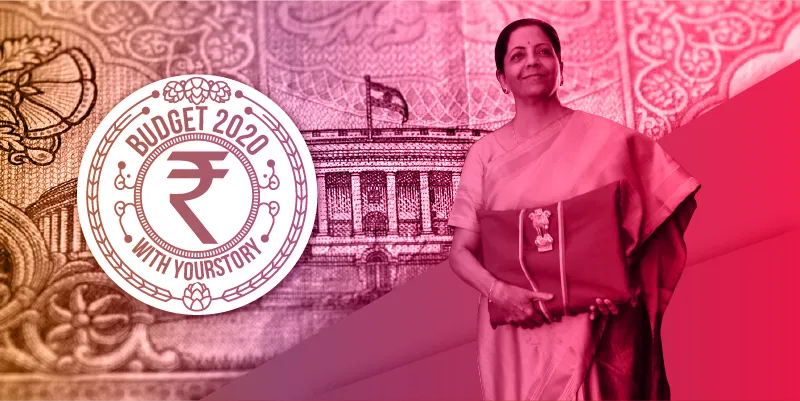Budget 2020: FM Nirmala Sitharaman unveils plans to revive economy, fulfil aspirations of all Indians
Finance Minister Nirmala Sitharaman’s Union Budget 2020 announced a slew of measures aimed at reviving the Indian economy, with the FM hailing startups as ‘engines of growth.’
Finance Minister Nirmala Sitharaman in her second Union Budget laid out a roadmap to boost India’s economic growth, outlining a slew of measures aimed at fulfilling the aspirations of all Indians.
In her Budget 2020-2021 speech – one that Prime Minister Narendra Modi lauded as having vision and action – India’s first full-time woman finance minister announced a Budget that will boost people’s income and enhance their purchasing power.
“We wish to open up vistas for a vibrant and dynamic economy with a gentle breeze of new technology,” Sitharaman said in her Budget speech at the Lok Sabha.
Eschewing the modern briefcase in favour of the traditional ‘bahi-khata’ ledger, the finance minister had her task cut out for her amidst a perceptible slowdown in the Indian economy.
Budget 2020: three key themes
Unfazed, she unveiled a roadmap to take India to the next level through a Budget that is based on three core themes: aspirational India, economic development for all, and creation of a caring society.
“Let our businesses be healthy, solvent, and tech-led. Our people should be gainfully employed, our businesses should be healthy for all minorities, women and people from SCs and STs. This Budget aims to fulfil all their aspirations,” Sitharaman said in one of the longest-ever Budget speeches in the history of India.
Interestingly, last year, the finance minister’s Budget speech lasted two hours and 17 minutes. This year, she stopped at two hours and 41 minutes, delivering a Budget speech that was laced with Kashmiri verse and Tamil poetry.

Following the Budget announcement, Prime Minister Narendra Modi in a televised address congratulated FM Sitharaman for a Budget that had both "vision and action" and said the new reforms would give a fillip to the Indian economy.
Corporate India and Indian startup founders and investors also hailed Budget 2020 for paving the way for growth for aspiring Indians by strengthening the earnings power of India’s majority agriculture-based middle class population.
India CEO and President Krish Iyer said,
“Budget 2020 would lead to creation of a new aspirational India, anchored around agriculture, health, and education. This Budget seeks to strengthen grassroots of the economy with its positive push towards creation of a strong agriculture infrastructure, which will give a big push to India’s rural sector. The rate cuts in the personal income tax rates would increase disposable income in the hands of the Indian middle-class, which will enhance consumption through improved purchasing power.”
Startups in focus
Even as Sitharaman promised to put more money in people's pockets and boost the income of farmers, she also recognised the role that startups have played as “engines of growth” for the Indian economy.
The Indian spirit of entrepreneurship, which has weathered several storms over the centuries, “inspires and motivates us. We recognise the need to support and further energise this spirit,” she said.
Clearly aware of the strides made by the 40,000-odd startups in the country that employ more than seven lakh people directly, FM Sitharaman focused on how they could be a game-changer for the economy in the near future.
“Startups have emerged as engines of growth for our economy. Over the past year, our government has taken several measures to hand-hold them and support their growth,” the finance minister said.
Seed fund for startups
Stating that entrepreneurship has always been the “strength of India”, the finance minister proposed a slew of measures to ensure ease of doing business for Indian startups, including a seed fund to support early-stage startups and an investment clearance and advisory cell for entrepreneurs, among other measures.
Calling India's growing crop of entrepreneurs “job creators”, she noted that the youth of India are giving up greener pastures to create new businesses and employment opportunities to help propel India’s economic growth.
She spoke about continuing the funding momentum for startups. “The government proposes to provide early-life funding, including a seed fund to support ideation and development of early stage startups.”
Anil Joshi, Managing Partner, Unicorn India Ventures, said, “The Budget has proposed a policy on early-life and seed-stage funding for startups to validate their business idea and run POCs. We believe this would help grassroot development and will be a boost for innovators.”
Sitharaman also announced a range of schemes for MSMEs and small businesses, saying that the sector was pivotal in keeping the wheels of our economy moving.
ESOP tax boost
FM Sitharaman announced a further measures for startups, including relief on the tax burden on employee stock option plan (ESOP) tax payments for employees working with startups.
“To give a boost to the startup ecosystem, I propose to ease the burden of taxation on the employees by deferring the tax payment by five years, or till they leave the company or when they sell their shares, whichever is earliest,” the Finance Minister said.
This comes as relief to startup employees, as currently, employees who hold ESOPs have had to face double taxation: at the point of exercise and during the time of sale.
Debjani Ghosh, President, NASSCOM, said, “One of the key asks from NASSCOM for boosting the startup ecosystem was the issue of ESOPs and allowing scaled-up startups to benefit from tax incentives. It’s heartening that Budget 2020 has simplified the ESOP policy and extended tax incentives for up to Rs 100 crore over a 10-year period.”
She added that incentives for MSMEs like audit exemptions for “up to Rs 5 crore companies” would enable “ease of business for small companies”.
Siddarth Pai, Founding Partner, , said, “The change in the ESOP taxation law is a step in the right direction, but much needs to done as there are other regulations that actually prevent employees from getting the full benefit.”
The proposed rule change on ESOPs will only apply to startups incorporated after April 1, 2016, and recognised by the inter-ministerial board. In essence, there is a long way to go before employees start to realise the actual benefit of ESOPs.
Focus on emerging tech
Aware of the massive strides made by technology, Budget 2020 also aims to put in place a mechanism where the nation can harness various benefits from the proliferation of emerging technologies, particularly data analytics, machine learning, robotics, bio-informatics, and artificial intelligence.
Stating that “data now is clearly the new oil”, Sitharaman proposed a policy to set up data centre parks across India to “skilfully incorporate data in every step of the value chain”. Sitharaman projected an allocation of Rs 6,000 crore under the Bharat Net Programme, with a focus on digital connectivity across India.
She also spoke about a digital platform to facilitate seamless application and capture of IPRs. In Institutes of Excellence, a centre would be established to work on complexity and innovation in the field of Intellectual Property.
Recognising the importance made by quantum computing, the finance minister said, “It is proposed to provide an outlay of Rs 8,000 crore over a period five years for the National Mission on Quantum Technologies and Applications.”
Satya Easwaran, Partner and Leader, Markets Enablement and Leader, Technology, Media and Telecom, KPMG in India, said, “In Budget 2020, technology has been clearly recognised as both a disruptor and enabler of new models of business and lifestyles. The government is looking to the future and the next generation of quantum technologies with the announcement of Rs 8,000 crore for further R&D in this field.”
He added that startups were receiving due attention with measures announced to “not just provide early-life funding from the government to support ideation and development, but also ensure that innovation and associated IP can be protected”.
Taxation issues
The Budget also unveiled numerous measures that would resolve various tax litigations that have become burdensome for startups.
“In order to take the reforms initiated by the department to the next level and eliminate human interface, I propose to amend the Income Tax Act so as to enable faceless appeal on the lines of faceless assessment,” the finance minister said.
Welcoming these initiatives and other measures, Neelesh Talathi, CFO, Pepperfry, said, “The Finance Minister has set the tone at the top by being empathetic about no tax harassment, resolving litigations etc. Resolving credit issues, APP-based working capital solutions, and more strategic aspects like National Logistic Policy are all initiatives that address the core issues of our MSME sector.”
The change in the income tax structure and the withdrawal of dividend distribution tax (DDT) are other measures that are seen as boosting the economy.
Challenges
However, there were quite a few action points or policies that could have been announced to further boost the startup ecosystem. These include the long-term capital gains tax, under which unlisted entities like startups face a higher burden at 28 percent along with a surcharge. There were expectations that this would be lowered.
V Balakrishnan, Chairman, Exfinity Ventures, said, “It is high on rhetoric as it is not going to affect the current economic slowdown. There are no big ideas that can reverse the downturn.”
Welcoming the measures announced on ESOPs, he said startups continue to be burdened with various compliance issues, which lead to increased paperwork.
At the same time, two important sectors found no mention in Budget 2020: ecommerce and fintech.
The hope was that the Budget would usher in steps that would have fundamentally revived consumer demand, which would have given a boost to the ecommerce industry, and also certain measures to boost digital finance.
Budget 2020 estimated that the fiscal deficit would be at 3.8 percent for FY20 and 3.5 percent for FY21. This is likely to be a worrying signal, especially for overseas investors keen to put money into the country.
With many investors giving the Budget the thumbs down, the Sensex crashed almost 1,000 points, ending at 39735.53.
However, Sitharaman remained optimistic on economic growth in the forthcoming financial year. “We have estimated nominal growth of GDP for year 2020-21, on the basis of trends available, at 10 percent,” she said.
(Edited by Teja Lele Desai and Tenzin Pema)









